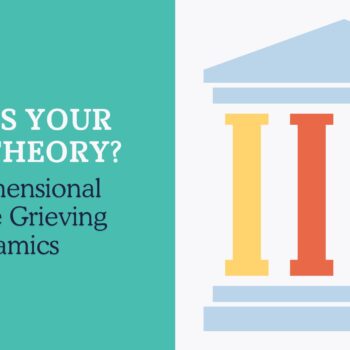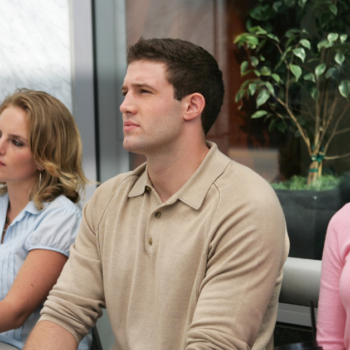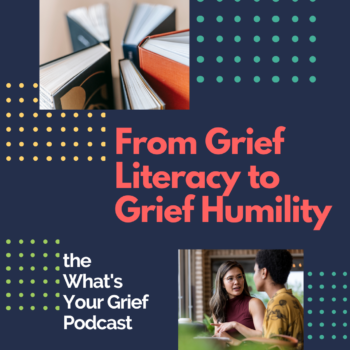Grief and Oral History: Keeping Memories Alive
/ General : Litsa Williams
Almost every time I delete a voicemail from someone I love, I have a thought that some might consider morbid:
What if this person dies and I’ve just deleted my last recording of their voice?
I know, a little morbid. But having worked in end of life and grief for a decade, I know all too well that people can disappear in an instant. I also know all too well the pain of missing someone’s voice, of trying to remember the sound and realizing it is slowly slipping away.
Then there are the stories. I remember when I was young, my paternal grandmother would tell me stories about her childhood, her parents, about all the objects and the artwork in her home. After my dad died, she would tell me stories of his childhood and his wild days in high school and college.
I also remember stories about my maternal grandmother’s life in West Virginia, where she ran a restaurant as a Greek immigrant. She would talk to me as she cooked, telling stories about food and family... but each year my memory of the stories get fuzzier and fuzzier.
A couple weeks ago, I went to a workshop in Baltimore put on by the wonderful women who make The Rise of Charm City. They are kindly sharing their expertise with the community to help and inspire people to gather oral histories. These could be histories big or small, from public figures to family members. As I sat and listened during the workshop, my grief brain started swirling. I wished I had recorded my grandmothers telling their stories; it would have been so easy. A few hours and a tape recorder... I could have had their voices and their stories preserved forever. I thought of all the stories people told about my dad and my sister's boyfriend, John, when they died. At the funeral and in the months after, I would see people and they would reminisce, telling me stories I had never heard. Though I felt like I was soaking the stories in, I didn’t write them down, and I certainly didn’t record them. Though I thought I would remember each of them forever, slowly they have faded... yet another loss that suddenly seemed preventable.
As a grief therapist and blogger, I love StoryCorps. (If you don't know what this is, you should go check them out immediately! They are pretty much the biggest, coolest oral history project ever. In fact, I'll include a little video about them below). I love oral histories like The Rise of Charm City. Needless to say, it immediately seemed absurd I hadn't taken the initiative to preserve these voices and stories.
My Message To You...
Once I got over kicking myself for not starting ‘oral history’ efforts in my own family, my grief-blogger brain started swirling. It occurred to me during this workshop that, if I hadn't made the effort to do oral histories with my family, there is a good chance many of you haven't either. The technology is there, and the process is so easy... All it might take is a little nudge to get some of us moving on recording these family stories. For me, it was that workshop. For you, maybe it will be this article. So this is just a little push to get you thinking about the stories you'll wish you had audio of some day. Maybe it will be family stories about the person who died, maybe it will be family stories from those who are still living about their own lives and memories, maybe it will be something else altogether.
Whatever it is, if recording family stories and histories is calling out to you, here are some tips, tricks, and ideas. I gathered these from The Rise of Charm City Oral History Workshop and from my own research (mostly on the StoryCorps website, where they have soooo many tools and ideas!).
Getting Started With An Oral History Project
Sit down and ask yourself the following questions to get organized.
- Who will you record?
- Will you record people individually or together?
- Where will you record?
- How/when will you ask the person to record them?
- What questions will you ask?
- What will you do with the recording(s) when you're done?
Tips for Equipment:
Keep it simple – the most important thing is to get started, not to let equipment be a barrier. Your smartphone likely has a ‘voice memo’ or other recording feature that will allow you to record. Verizon has some tips for recording audio on your smartphone. If you want to upgrade, a Zoom recorder is a mid-range option that will give you better recording quality without breaking the bank. This is a recorder we own and are familiar with. Another suggested in the workshop was a Tascam recorder, which looks to have great reviews.
Tips for Recording:
- Ask the person (or people) you will be interviewing if they have a preference where you record. You need somewhere quiet, but they may prefer their house to yours, their office to their house, etc.
- Find a quiet space and minimize any background noise. Even though it may initially seem quiet, sit silently in the space and listen closely for things like clocks ticking or appliances humming. These may seem like small things, but they can be distracting on a recording.
- When you start the recording, test to make sure everything is working before you officially get started. The last thing you want is to ask some great questions, get some great answers, and realize the equipment wasn't doing the job!
- When you start, make sure you say who you are and have the other person say who they are (and their relationship to you or your loved one). You know who you are and who they are, but years later if someone is listening to this audio you want it to be very explicit.
- Make sure you state the questions into the mic, so both the questions and answers can be heard.
- Try to avoid verbally acknowledging people while they talk. Though we normally say things like, “yes” or “that’s interesting” while people speak, to show we are listening and engaged, this can interfere on getting a clear recording. Try to acknowledge by nodding instead of speaking, to keep the audio clear.
- Make note of things you want to come back to. Though you might have questions you plan to ask, while giving an answer the person you are interviewing might say things that spark other questions, or follow up questions. Don’t interrupt, but make a quick note so you can go back and ask the additional questions. If you have a better attention span than I do, you can do this mentally. Personally, I would stick with a pencil and paper nearby.
- At the end, ask the person if there are other things they would like to share that you didn’t ask about.
After You’re Done Recording:
Whether you have recorded one person or 20 people, it will be important to decide what you want to do with the recordings. If you have multiple recordings you may want to edit them into a larger, cohesive whole. For example, if you are recording memories and stories about your loved one and you ask everyone the same (or similar) questions, it could be interesting to created a final recording that assembles many different individuals’ answers to the same questions. There is a free, open source program called Audacity that can be used to do your own editing, or you can hire someone to edit for you.
You will then want to decide if you will share these recordings in some way and how you will store them. If you save them on a phone, laptop or computer, it is important to back them up somewhere else. The last thing you want is to go out of your way to record these stories and memories, only to lose them in a crash.
Tips For Interviewing Family Members With Memory Loss:
Storycorps, and great oral history project, has a whole toolkit for interviewing people with memory loss. If you’re planning to interview someone with memory loss, I suggest you check out their toolkit here. You can also listen to some examples of audio oral histories done with those with memory loss from the story corp project below:
A Project For Those With Serious Illness:
StoryCorps has a great project that partners with hospitals and hospices to help individuals with terminal illness and their families to do interview and share their stories. You can check out a list of partnering organizations working with StoryCorps on this Legacy initiative here.
Grief and Oral History:
Storycorps has complied all sorts of great questions for all different people you may be interviewing for an oral history, including a specific list for grievers remembering a loved one. You can check out all their question suggestions here, and their “remembering a loved one” questions are below.
REMEMBERING A LOVED ONE QUESTIONS:
• What was your relationship to _____?
• Tell me about _____.
• What is your first memory of _____?
• What is your best memory of _____?
• What is your most vivid memory of _____?
• What did _____ mean to you?
• Are you comfortable/ can you talk about _____’s death? How did _____ die?
• What has been the hardest thing about losing _____?
• What would you ask _____ if _____ were here today?
• What do you miss most about _____?
• How do you think _____ would want to be remembered?
• Can you talk about the biggest obstacles _____ overcame in life?
• Was there anything you and _____ disagreed about, fought over, or experienced some conflict around?
• What about _____ makes you smile?
• What was your relationship like?
• What did _____ look like?
• Did you have any favorite jokes _____ used to tell?
• Do you have any stories you want to share about _____?
• What were _____’s hopes and dreams for the future?
• Is there something about _____ that you think no one else knows?
• How are you different now than you were before you lost _____?
• What is the image of _____ that persists?
• Do you have any traditions to honor _____?
• What has helped you the most in your grief?
• What are the hardest times?'
Alright, there it is, your little nudge. Let us know if you're feeling inspired by leaving a comment. Or, if you have done something like this, tell us about it! And as always, subscribe to get new posts right to your inbox.
We wrote a book!
After writing online articles for What’s Your Grief
for over a decade, we finally wrote a tangible,
real-life book!
What’s Your Grief? Lists to Help you Through Any Loss is for people experiencing any type of loss. This book discusses some of the most common grief experiences and breaks down psychological concepts to help you understand your thoughts and emotions. It also shares useful coping tools, and helps the reader reflect on their unique relationship with grief and loss.
You can find What’s Your Grief? Lists to Help you Through Any Loss wherever you buy books:





Harmony September 23, 2019 at 5:28 pm
You can also use Audacity to record and save your voicemails outside your phone. Here is the article I used to learn how to do it: https://time.com/3666242/save-voicemails/ I wish I had thought to look for something like this earlier. But I am glad I have it now.
Sandy Frankel March 22, 2018 at 12:30 am
My Husband recored his Grandfather-a survivor who escaped Poland, and now his Father who is 90. Antisemitism in America, his journey from the Bronx to CA.
My son passed away 4 years ago, I have most of his voice messages from my phone saved on my computer. I get to hear his voice, his Mothers Day message, his message when he saw 2 corgis in NY Central park ( his favorite-we now have 2) his question about how to light a BBQ. Brings me to my knees each time, but I am so grateful to still have his voice.
Sandy Frankel March 22, 2018 at 12:30 am
My Husband recored his Grandfather-a survivor who escaped Poland, and now his Father who is 90. Antisemitism in America, his journey from the Bronx to CA.
My son passed away 4 years ago, I have most of his voice messages from my phone saved on my computer. I get to hear his voice, his Mothers Day message, his message when he saw 2 corgis in NY Central park ( his favorite-we now have 2) his question about how to light a BBQ. Brings me to my knees each time, but I am so grateful to still have his voice.
Nina March 21, 2018 at 6:52 pm
I depend on these articles as I’m currently in throws of new grief, my entire family is gone and this past year I lost both my children. It’s too late for me to record anyone but, I have started the process of writing what I know from memory to create story lines for many of my family member. It’s a tough task, I cry a lot but, I do have an estranged granddaughter that I hope one day will receive these stories and they’ll be meaningful to her. I also, work on genealogy, and these stories will accompany my ancestry work and again, hopefully, end up in some repository.
Nina March 21, 2018 at 6:52 pm
I depend on these articles as I’m currently in throws of new grief, my entire family is gone and this past year I lost both my children. It’s too late for me to record anyone but, I have started the process of writing what I know from memory to create story lines for many of my family member. It’s a tough task, I cry a lot but, I do have an estranged granddaughter that I hope one day will receive these stories and they’ll be meaningful to her. I also, work on genealogy, and these stories will accompany my ancestry work and again, hopefully, end up in some repository.
Elisabeth Burgess March 21, 2018 at 5:54 pm
We were given an amazing legacy. A war journalist was embedded with Bryan’s unit in Afghanistan and filmed themission that he and the other 5 soldiers were killed in. The unit chaplain also did some filming of Bryan talking about his children who were 4 and 3 when he died. All the footage was turned into a documentary called The Hornest’s Nest. Our grandchildren will forever have footage of Bryan talking about how much he loved them and they will know where he was and what he died for. That is a priceless gift that not many families get.
Elisabeth Burgess March 21, 2018 at 5:54 pm
We were given an amazing legacy. A war journalist was embedded with Bryan’s unit in Afghanistan and filmed themission that he and the other 5 soldiers were killed in. The unit chaplain also did some filming of Bryan talking about his children who were 4 and 3 when he died. All the footage was turned into a documentary called The Hornest’s Nest. Our grandchildren will forever have footage of Bryan talking about how much he loved them and they will know where he was and what he died for. That is a priceless gift that not many families get.
Dawn Roode March 21, 2018 at 3:40 pm
I preserve people’s personal histories in book form, and it is a rewarding and meaningful process. While I record the interviews that eventually turn into heirloom books, I do not presently include audio recordings in the packages I provide to my clients, even though I have thought about it. This blog post has given me just the push I need to get started on that effort; I am going to excerpt snippets of conversation and provide on a disk as a complement to the books.
My own mother died unexpectedly when just a few months after I gave birth to my son, and creating a tribute book and sharing memories of her with family will both always be healing experiences—but I do so wish I had some recording of her, where I could hear not only her voice, but her infectious laugh…just one more time! Thank you for writing this post.
Dawn Roode March 21, 2018 at 3:40 pm
I preserve people’s personal histories in book form, and it is a rewarding and meaningful process. While I record the interviews that eventually turn into heirloom books, I do not presently include audio recordings in the packages I provide to my clients, even though I have thought about it. This blog post has given me just the push I need to get started on that effort; I am going to excerpt snippets of conversation and provide on a disk as a complement to the books.
My own mother died unexpectedly when just a few months after I gave birth to my son, and creating a tribute book and sharing memories of her with family will both always be healing experiences—but I do so wish I had some recording of her, where I could hear not only her voice, but her infectious laugh…just one more time! Thank you for writing this post.
Patty Woodruff March 21, 2018 at 2:44 pm
I lost both of my parents only 45 days apart. I’m an only child so I really wish I had sat down with my iPhone and recorded an oral history by both of them. I have no excuse because I had the technology to do this – in my purse. One thing I did do though, and I’m glad I did, was record my Mother’s voice from their voicemail message. I transferred their home phone number to my cell and before I recorded my own message, I recorded hers – for keeps. Every once in a while I play it…just to hear her beautiful voice for real.
Patty Woodruff March 21, 2018 at 2:44 pm
I lost both of my parents only 45 days apart. I’m an only child so I really wish I had sat down with my iPhone and recorded an oral history by both of them. I have no excuse because I had the technology to do this – in my purse. One thing I did do though, and I’m glad I did, was record my Mother’s voice from their voicemail message. I transferred their home phone number to my cell and before I recorded my own message, I recorded hers – for keeps. Every once in a while I play it…just to hear her beautiful voice for real.